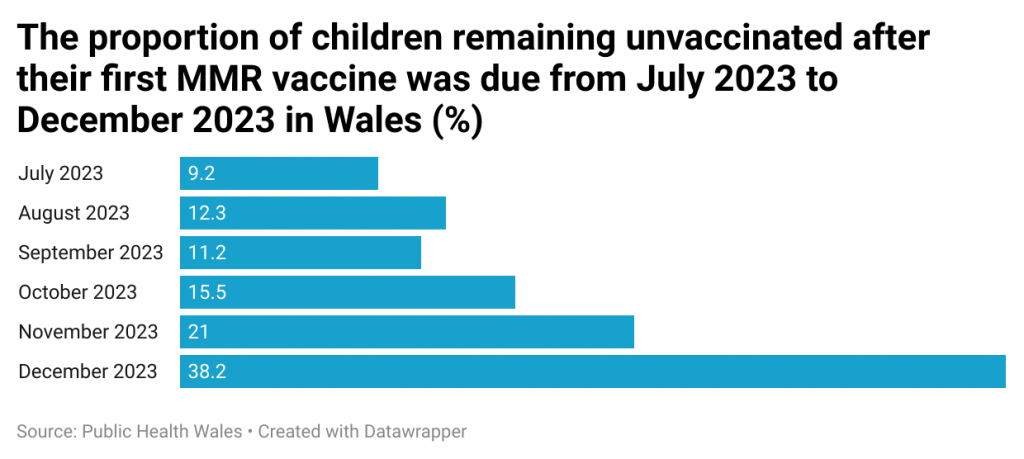In a November 2023 outbreak, Cardiff had the most suspected cases of measles in England and Wales
PARENTS in Cardiff are being urged to ensure their children receive the MMR vaccine amid fears of a new measles outbreak.
The warning of “rising concerns” at a new outbreak comes from a statement from Cardiff and Vale University Health Board (CAVUHB).
There were eight confirmed cases of measles in Cardiff during the November 2023 outbreak – 32 across the year, Public Health Wales (PHW) said in January 2024. According to the UK Health Security Agency, Cardiff had the highest suspected number of cases in any English or Welsh city.
Current concerns are exacerbated by the fact that in Wales the amount of children aged five with both doses of the MMR vaccine has decreased to 89.5%, according to PHW.
“Measles can cause children to become very ill and some who contract it will suffer life-changing complications,” says Sir Frank Atherton, Wales’ Chief Medical Officer.
Sir Frank wants the uptake of the MMR vaccine to increase to 95%. He says that this the target that the World Health Organisation recommends to best protect Welsh people from an outbreak.
Dr David Ellman, who works for Great Ormond Street Hospital, pointed out that a young adult died during the last major outbreak of measles in Wales in 2023.
“We see deaths from both the immediate, but also the long term effects [of measles],” he says.
What is the MMR vaccine?
The MMR vaccine involves a course of two doses. The first dose is taken usually after a child is two years old, and the second dose is when they are five. However, the uptake of the MMR vaccine has decreased in recent years.
The consequences of not having the MMR vaccine can be immense, as it can spread rapidly among nurseries and schools, CAVUHB say.

Measles is highly infectious and can be severe for vulnerable people. Those vulnerable to complications from measles include “babies and young children, pregnant women, and people with weakened immunity,” says CAVUHB.
What are the symptoms to look out for?
Measles symptoms include “a distinctive red or brown rash that may be more difficult to see on darker skin. The rash follows a fever, cough, runny nose, and red eyes (conjunctivitis)”.
Those who do not have the MMR vaccine can also get infected with mumps and rubella, Dr Ellman said.
“Rubella infection in early pregnancy has a very high risk of causing damage in the unborn baby.
“Mumps can also be a serious disease causing meningitis, and less commonly, one-sided deafness.”
Sir Frank said: “We need to ensure that those at risk in our communities are protected against potentially life-threatening viral infections like measles and whooping cough.”
- CAVUHB encourages parents to check their child’s personal child health record (red book) if they are unsure of whether their child(ren) are vaccinated.
- Or: Contact the Local Child Health Team on 02921 836926 or 02921 836929 or your GP Practice. The GP practice website may have an option to make an electronic request to check your child’s vaccination status.
- You can arrange for your child to get the MMR vaccine via your GP Practice or local Mass Vaccination Centre.
- To find out more, call 02921 841234. Phone lines are open Mon-Fri between 9am and 5pm.



